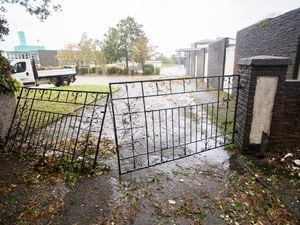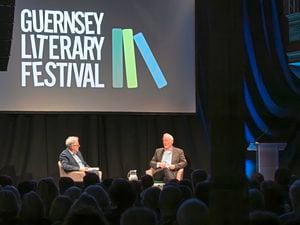Workman with asbestos concerns sacked unfairly
BUSINESSMAN Quentin Hubbard unfairly dismissed an employee because he raised serious health and safety concerns that included working in a building that was ‘full of asbestos’.

An employment and discrimination tribunal awarded nearly £19,000 to handyman Kevin Driscoll against respondents FW Rihoy & Son – an electrical firm Mr Hubbard had control over.
Several businesses linked to Mr Hubbard have been struck off in recent months, including FW Rihoy & Son.
Mr Driscoll represented himself at the hearing. Mr Hubbard did not attend or resist the complaint.
As a general handyman, Mr Driscoll worked around 40 hours a week across Mr Hubbard’s associated businesses. These included FW Rihoy & Son Ltd, Qube Group, Carpet Solutions, Ricochet Group, Sarnia Estate Agents, Gallery Magazine (GSY Life Magazine) and the Champagne Shop.
The tribunal heard that Mr Driscoll ‘noticed that money seemed to be starting to get short’ after 18 months and that he was ‘being asked to cut corners’ and ‘do things he was not comfortable with’.
In one instance, Mr Driscoll was asked to refit a gas boiler in a building despite not being registered to do so, a legal requirement.
When he raised objections Mr Hubbard was ‘unhappy’ about his response, Mr Driscoll said in evidence.
A few weeks later Mr Driscoll and others had been told by one of Mr Hubbard’s ‘main managers’ not to go into the same property as it was ‘full of asbestos’.
Mr Driscoll said that, when asked, Mr Hubbard said there was no dangerous asbestos in the property and to ‘stop listening to rumours’ promising to bring in the asbestos report the next day.
The tribunal was told that, despite being asked daily, Mr Hubbard did not let Mr Driscoll see the report.
While working on Mr Hubbard’s house the applicant told Mr Hubbard that he needed to see the report because there were still men working in the building.
He threatened to speak to the appropriate authorities if he did not see the report because he was concerned about their health.
The site was closed by the Health and Safety Executive (HSE) a few months later.
On 6 November 2017, Mr Driscoll was told via a letter from Mr Hubbard that the company had ceased trading on 2 November.
He had not yet received his wages from October.
Mr Hubbard offered Mr Driscoll the van he had been using in place of wages and said that ‘he did not owe him a penny as it was the company that did and they had no money’.
Mr Driscoll told the panel that he had asked if there were vacancies at any of the other businesses he had worked for alongside Mr Hubbard and was told there were none.
On 13 November 2017, Mr Driscoll received his wages from Mr Hubbard’s personal account but neither his social security nor tax had been paid. Additionally, there was no payment in lieu of notice or holiday pay.
Mr Driscoll believed that ‘Mr Hubbard felt he knew too much about Mr Hubbard’s shortcomings and shortcuts and that Mr Hubbard knew [he] was prepared to speak out – especially when he felt that safety was ignored’.
Mr Driscoll felt this was one of the reasons he lost his job when others kept theirs.
In its written ruling, the panel, chaired by Paula Brierly, said: ‘The tribunal found the witness testimony put forward by the applicant to be highly credible and is persuaded that the principle reason for him being selected for redundancy and not offered alternative employment was due to the applicant raising concerns of a health and safety nature.’
It said that the burden of proof lies with the respondent to demonstrate that the dismissal was for a fair reason and that it acted reasonably in treating it as a sufficient reason for dismissing the employee.
‘The tribunal saw no evidence to suggest that the principles of a fair procedure had been applied to the applicant’s situation by the respondent.
‘There had been no consultation before a final decision had been reached, no fair and objective basis for redundancy selection and no offer of alternative employment in any associated company under Mr Hubbard’s control, even though it appears that offers of alternative employment had been made to other employees.’
It awarded Mr Driscoll six months’ pay of £18,720.
HEALTH and Safety does not know how or when asbestos was removed from the site at the heart of the case.
Chief health and safety officer Robin Gonard said the site was found to contain asbestos in 2013 and did not have a certificate of re-occupation at the time it was reported to them this year.
‘The previous survey was undertaken in 2013. When a survey identifies asbestos containing materials, it also identifies their condition, and makes recommendation as to management or removal.
‘In late March 2018 ... we became aware of the alleged presence of asbestos. At that point, it was clear that some asbestos had been removed, but HSE were unable to ascertain whether all the work was carried out by a competent contractor, as HSE received no notification of asbestos removal.
‘In addition, no certificate of re-occupation was issued by a UKAS accredited analyst. As a consequence, HSE served a prohibition notice on 27 March 2018.
‘An asbestos survey later confirmed that asbestos previously identified had been removed, though we could not ascertain when or how, due to the time elapsed since the previous asbestos survey,’ he said.





